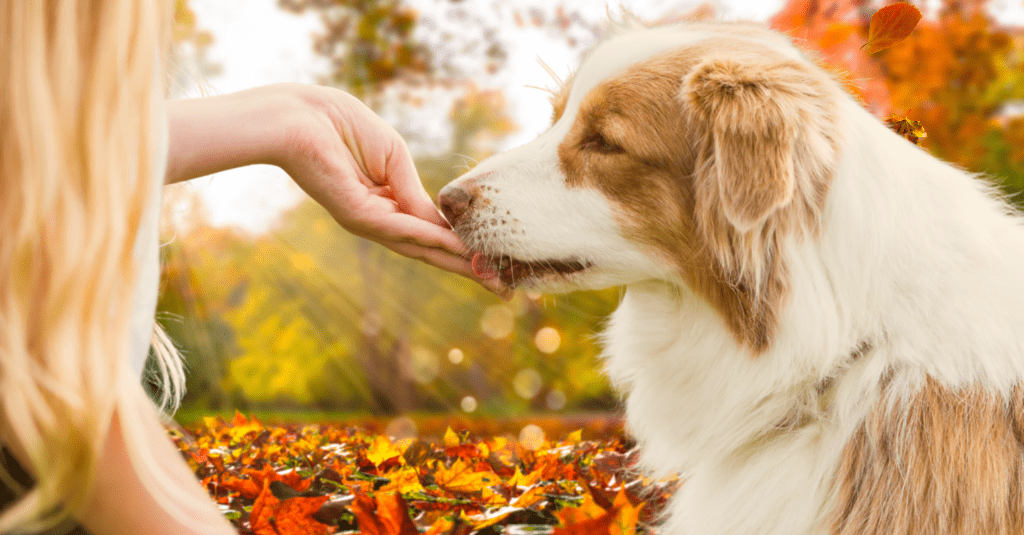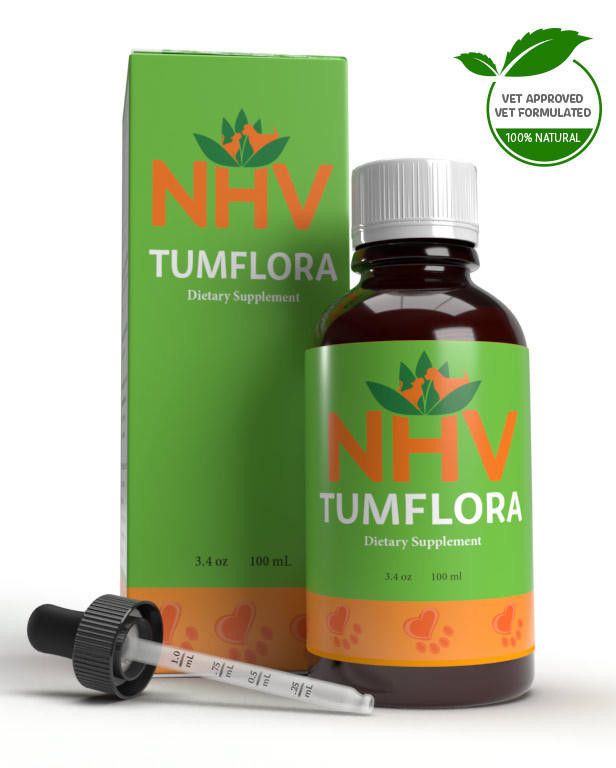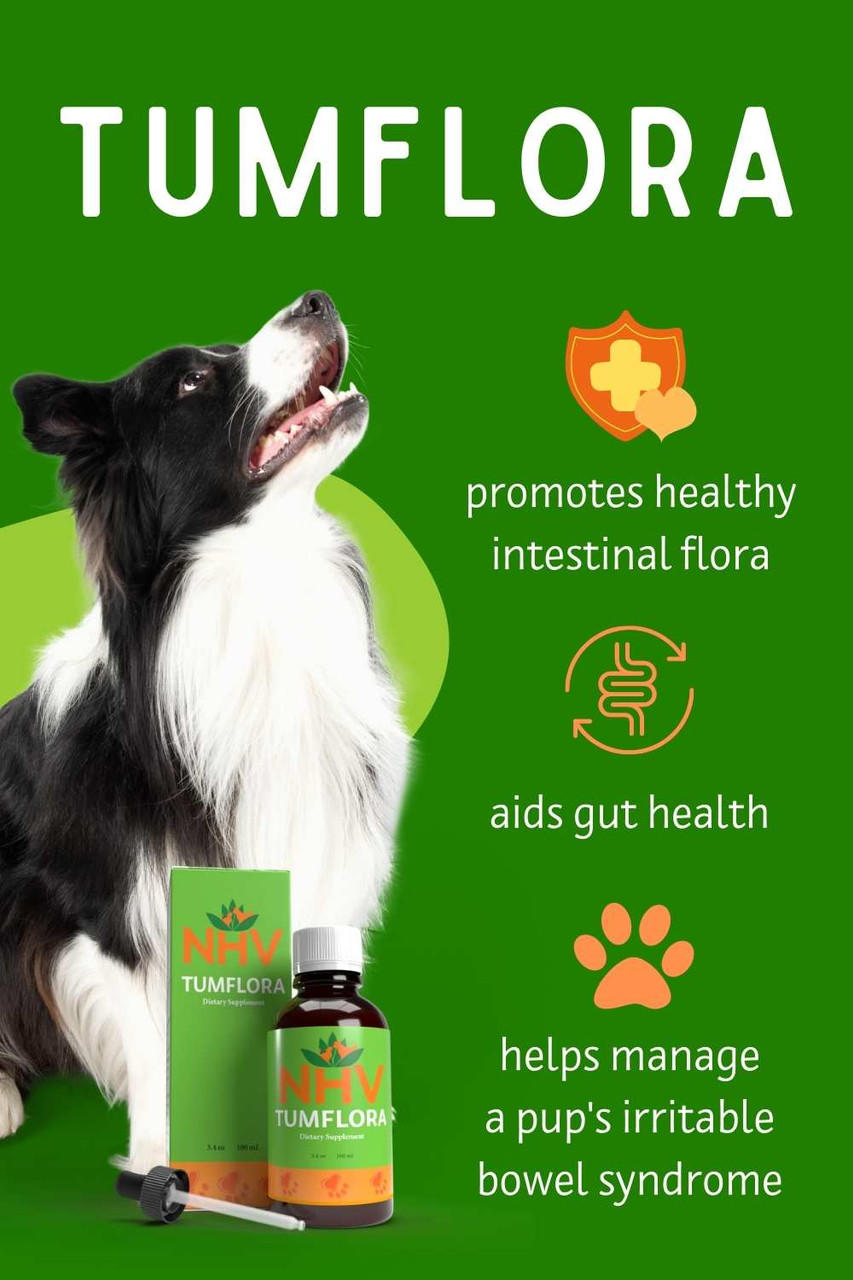- Description
- Ingredients
- Dosage
- FAQ
Description
Like humans, Inflammatory or Irritable Bowel Disease, also known as IBD, is a common gastrointestinal problem in dogs. When your furbaby has IBD, inflammatory cells within their body begin to invade the gastrointestinal (GI) tract. The stomach, small intestine, and large intestine are all part of the GI tract. Once inflammatory cells start to take over the GI tract, a thickening of the intestinal wall can occur, upsetting daily functions like absorption and the movement of food (peristalsis). There is no clear cause for IBD in dogs, but studies show that genetic and external factors can predispose your pet to have IBD. Some additional contributing factors may be chronic irritation of the intestines caused by constant vomiting and diarrhea, food allergies, parasites, and autoimmune disorders.
How TumFlora Supports GI Tract Health
TumFlora is a natural herbal vet formulation designed to help improve intestinal flora. In addition to helping improve intestinal flora, and helping with inflammation of the digestive tract, TumFlora contains herbs that are highly nutritious like slippery elm to further help your furbaby heal. Slippery elm is high in vitamins and minerals such as vitamin A, B complex, C, K, calcium, magnesium and sodium. The gentle defense against microorganisms and anti-fungal properties of herbs like oregon grape aid the body to fight off infections. Finally, herbs like fennel and chamomile help to relieve stomach cramps and indigestion and help with overall discomfort.
This soothing liquid formulation is easy to administer and helps maintain a healthy gut. In addition to helping IBD in dogs, TumFlora is also useful for pets suffering from food allergies, gastrointestinal ulcers and bacterial, gut infections. TumFlora is also a great addition to your pet’s daily regimen as a proactive approach for a healthy gut.
Symptoms of IBD in dogs
Dogs will occasionally vomit or have diarrhea because something doesn’t sit right with their tummies, or maybe they ate too much or too little that day. But if your furkiddo begins to vomit and their poops are runny on a regular basis then it could be IBD. Keep your eye out for these additional symptoms:
- Weight loss
- Loss of appetite
- Straining to defecate
- Lethargy
Typically your vet will do a full-body exam, check your dog’s history, conduct a blood panel, take a stool sample, and possibly opt for x-rays and/or an ultrasound. IBD in dogs can be tough to diagnose because your vet will have to check for a variety of conditions as well as vital organ functions before they can confirm diagnosis. Other health conditions that have similar symptoms to IBD are GI parasites, kidney or liver disease, pancreatitis, cancer, or foreign substances and objects in the intestines. To confirm IBD, your vet may eventually conduct a biopsy on your pup's stomach and/or intestinal tract.
Additional Holistic Support for Inflammatory Bowel Disease in Dogs
A combination of vet-prescribed medication and nutritional therapy is often recommended to alleviate symptoms of inflammatory bowel disease. If your pet is prone to inflammatory bowel disease in dogs, changing your dog’s diet to a more gut-friendly one is recommended. Click here, if you would like a personalized nutrition plan tailored to your pet's unique needs.
At NHV, we are a team of holistic veterinarians, pet experts, and animal enthusiasts. Get in touch with us if you have any questions or concerns about your pup’s GI tract health or need extra support.
- item number
- PH8900d
- weight
- 0.70 LBS
- volume
- 3.4 fl. oz. (100ml)
- life stages
- adult, senior, puppy
- form
- liquid
- made in
- canada
Disclaimer: The information provided in relation to the products mentioned is intended for general informational purposes only and should not be construed as professional veterinary advice or a substitute for consultation with a qualified veterinarian. These products are not intended to diagnose, treat, cure, or prevent any pet health condition. Consult a licensed veterinarian before using any product or making changes to your pet's diet, health, or wellness routine. Individual pet health outcomes may vary, and the effectiveness of the product may depend on various factors specific to your pet. Always carefully read and follow the product label and instructions. The manufacturer and distributor of these products do not assume any liability for any direct or indirect consequences that may arise from the use of these products on pets. All information is for educational purposes only.
Ingredients
Made with the finest, organically grown, or ethically harvested herbs. Made specifically for pets, vet-formulated, and vet approved.
Ashwagandha also known as Indian ginseng has a long history of use for its anti-inflammatory properties and ability to defend against microogranisms. It may help with anxiety and stress, immune support, and promote healthy cholesterol and blood sugar levels.
Boswellia a.k.a. Indian frankincense has effective discomfort relieving and anti-inflammatory properties which may be beneficial for alleviating symptoms of inflammatory bowel disease in dogs, asthma, and osteoarthritis.
Chamomile has been used as a digestive tonic for centuries to soothe and heal the digestive tract. It is an excellent calming agent with anti-inflammatory, analgesic, antispasmodic, and sedative properties to soothe chronic or acute gastric disorders and IBD in dogs.
Fennel's nutrient dense properties are especially beneficial for digestive problems, relaxing spasms, relieving cramps, and helping to restore appetite.
Indian Gooseberry has been used for over millennia in Ayurvedic medicine to help alleviate symptoms of heartburn, diarrhea, and nausea.
Licorice is an herb with an affinity for the digestive, respiratory, and endocrine systems. It helps to cleanse the blood, lubricate and protect mucous membranes, and ease tissue damage in the upper digestive tract.
Marshmallow is a mucilaginous herb whose anti-inflammatory and diuretic properties help to soothe and soften irritated tissues. It is beneficial for gastroenteritis, peptic and duodenal ulceration, ulcerative colitis, and enteritis.
Oregon Grape is an anti-parasitic tonic that helps combat various forms of fungal and bacterial infections. It helps to relieve indigestions and malabsorption.
Slippery Elm supports eliminating toxins and waste by lubricating the digestive tract. It is a rich source of vitamins (A, B complex, C, K) and minerals (calcium, magnesium, and sodium). It may help alleviate symptoms of gastritis, colitis, and diarrhea.
Inactive ingredients such as water, glycerin, or bases for ointments like olive oil are not listed in this ingredient tab. For a full list of ingredients, please see the label picture on the bottle, shown above. Information about ingredients is for educational purposes only. It is important to always refer to the product label for the most accurate and up-to-date information regarding ingredients.
Dosage
Pet's Weight Dosage
To be taken twice daily. All NHV supplements are designed to be used together, and can, therefore, be given at once for convenience.
Select your pet's weight to determine the correct dose.
To be taken twice daily. Determine your pet’s weight and then use the easy chart below to determine the correct dose. This is the minimum dosage.
Pet's Weight Dosage
0 - 15 lb = 0.5 ml
16 - 30 lb = 1.0 ml
31 - 45 lb = 1.5 ml
46 - 60 lb = 2.0 ml
61 - 75 lb = 2.5 ml
Over 75 lb = 3.0 ml
How to Administer
Shake well before use. The easiest method is to use the dropper provide and places the drops into your pet’s food or favorite treat. You can also use the dropper and squirt directly into the pet’s mouth.
Some pets can be finicky, if this occurs consider hiding the drops in foods most pet’s love such as fish, chicken or yogurt or a favorite treat. If your pet only eats dry food then soak a few kibbles at feeding time.
For Best Results
Herbal dietary supplements are beneficial to the health and wellbeing of your pet and are safe for long-term use. Every pet responds to natural herbal supplements differently, therefore it is important to be consistent and administer the product daily. Supplements generally take two to four weeks to take effect, however this will vary from one animal to the next.
Product Storage
All NHV Natural Pet Products are pure herbal extracts and contain no artificial additives, preservatives or coloring. Shelf life after opening is 6 months and must be refrigerated after opening.
Cautions and Contraindications: Do not use TumFlora in pregnant or nursing animals. Speak to your vet before using our products. A second visit is recommended if your pet’s condition does not improve, or deteriorates after continued use of the supplements.
If you would like a home-cooked nutrition plan, our in-house veterinarian Dr. Amanda can formulate a plan specific to your pet’s health requirements.
FAQ
What do you feed a dog with IBD?
For a dog with IBD, changing their diet to a hypoallergenic diet or an elimination diet with a source of protein that they are not familiar with could work well since the underlying cause may be related to food allergies. In order for your dog to get their proper nutrients, a hypoallergenic or elimination diet should only be done with the guidance of a veterinary professional.
If you would like a home-cooked nutrition plan, our in-house veterinarian Dr. Amanda can formulate a plan specific to your pet’s health requirements.
How do I know if my dog has IBD?
IBD/IBS in dogs may be challenging to diagnose because the diagnosis process is one of “a process of elimination”. Your vet must rule out many other conditions first. Health problems that have similar symptoms to IBD are GI parasitic infections, kidney or liver disease, pancreatitis, cancer, or foreign substances in the intestines.
Typical symptoms are:
- Frequent diarrhea
- Weight loss
- Vomiting
- Loss of appetite
- Straining to defecate
- Lethargy
How do they test for IBD in dogs?
To test for IBD, your vet will likely do a full-body exam, check their medical history, conduct a blood panel, take a stool sample, and possibly opt for x-rays and/or an ultrasound. The most accurate way to confirm a diagnosis for IBD may be invasive and may involve surgery, an endoscopy, and/or FNA guided ultrasound in order to collect a tissue sample from their intestines or stomach. In many cases, this is not possible so typically a veterinarian will start your pet on a treatment plan for IBD rather than opting for surgery.
Is IBD in dogs life-threatening?
Depending on how advanced the IBD is and what the underlying causes are, in rare cases, some dogs have managed to completely recover. However, for the majority of pups, this is a lifelong condition and if left untreated, IBD can be life-threatening.



 CAD
CAD
 US Dollar
US Dollar





